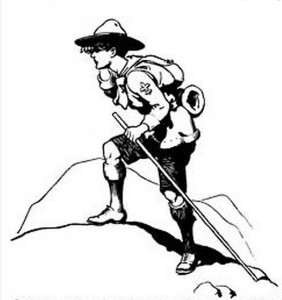 In the September 2016 (yes, it’s out in June) issue of Writer’s Digest, there’s an interesting “inkwell” column called “Scout’s Honor: What is a literary scout, anyway?” by Stephanie Stokes Oliver. Got my attention right away.
In the September 2016 (yes, it’s out in June) issue of Writer’s Digest, there’s an interesting “inkwell” column called “Scout’s Honor: What is a literary scout, anyway?” by Stephanie Stokes Oliver. Got my attention right away.
Evidently these literary scouts act as liaisons between authors and literary agents, editors, and publishers. I know, right away you’re thinking, “oh, no, another middle man.” Since I’ve been querying agents for my novel for several years now, and directly querying independent presses for several months for my essay collection (and now for my novel), I share your pain. What can a scout do for me? Who do they work for?
In addition to scouts who work for literary agencies and Amazon’s Kindle Scout program, there are also scouts who work directly for publishing houses, like Oliver, who wrote this article in WD. She works for Simon & Schuster’s Atria Books. You can read her submission guidelines here.
Oliver’s submission process for nonfiction books (she doesn’t work with fiction) is very similar to many agents’ guidelines—she requests a book proposal and sample pages. It would only take me about ten minutes to whip these off to her via email, and maybe I will. Or maybe I’ll wait until I hear back from a couple of small presses who are currently reading my essay collection. It’s definitely something to consider.
 If you’re interested in finding a literary scout, how do you go about it? That seems to be the tricky part. They seem to be “out there” looking for good writing, so watch what you put on your personal blog, and keep submitting essays to journals, which they might be reading in search of a new author. New York-based Maria B. Campbell Associates (MBCA) Inc. has scouts working for publishing houses in 19 countries but their website says they don’t accept unsolicited proposals or manuscripts, so it seems that their scouts have to find us, rather than the other way around. I hadn’t even heard of literary scouts until I read this article, but they’ve been out there for quite a few years, as evidenced by this 2009 article by Emily Williams, who used to be a scout for MBCA.
If you’re interested in finding a literary scout, how do you go about it? That seems to be the tricky part. They seem to be “out there” looking for good writing, so watch what you put on your personal blog, and keep submitting essays to journals, which they might be reading in search of a new author. New York-based Maria B. Campbell Associates (MBCA) Inc. has scouts working for publishing houses in 19 countries but their website says they don’t accept unsolicited proposals or manuscripts, so it seems that their scouts have to find us, rather than the other way around. I hadn’t even heard of literary scouts until I read this article, but they’ve been out there for quite a few years, as evidenced by this 2009 article by Emily Williams, who used to be a scout for MBCA.
Just when you thought the publishing business couldn’t get more complicated, you discover a “secret world” of people competing for a piece of the pie. I’m just trying to keep up.